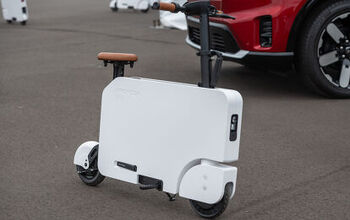NHTSA Closes Barn Door, Hides Evidence

The NHTSA has definitely shut down on-line access to attachments in their Office of Defect Investigation complaint database. It’s about time, but it isn’t enough. To quote Kris Kristofferson, the database has always been “a walking contradiction, partly truth and partly fiction.” The database has been abused for political propaganda purposes. Now, that it has served its purpose, the database is being shut down. Partially. They have locked away the only content that is of real value: The evidence. We preserved some. To show you what you will be missing.
The complaint database contains everything, from someone who has heard something somewhere from someone, to detailed accident investigations. Want to beat a ticket? File a report. Try to get out of jail where you landed due to vehicular manslaughter? File a report. Want to smear a manufacturer you don’t like? File a report. Have a serious problem? File a report. It’s all there.
Until yesterday, some of the more carefully filed reports had PDFs of scanned documents attached. These documents ran the gamut from lawyer letters to accident reports prepared by uniformed police. You could find search warrants for black boxes. You could find data readouts from black boxes. You also could find a lot of personal information. That is all gone.
Yesterday, NHTSA switched off access to the documents linked to the reports. Most likely, this was triggered by a report that “names, birth dates, social security numbers, addresses, VINs, and drivers license numbers” are contained in these documents. This was revealed by frequent TTAC commentator Carquestions, who documented it in a Youtube video. In the video, Carquestion says: “NHTSA appears to be a source for identity theft.”
The story was picked up by Slashdot and went from there all over the Internet. Curiously, the mainstream media that usually buzzes to NHTSA database stories like flies to you-know-what, is quiet. Said one Slashdot commentator: “The guy who discovered and reported the leak is a Canadian. So not only is the government leaking sensitive information, it took a foreigner to discover and disclose it. Embarrassment all around today.”
Someone at the NHTSA (we are still waiting for an official comment) must be more alarmed than the dozing media. There is the possibility that the Privacy Act of 1974 has been violated. The law says that “no agency shall disclose any record which is contained in a system of records by any means of communication to any person, or to another agency, except pursuant to a written request by, or with the prior written consent of, the individual to whom the record pertains.” There are the usual caveats, if interested, look them up. Civil suits can be brought against the agency. Criminal charges can be brought also. A violator “shall be guilty of a misdemeanor and fined not more than $5,000.”
Violating the privacy of a citizen is less costly than the late filing by an automaker (can cost $16.4m currently, $200m if the amended version of the Motior Vehicle Safety Act is signed into law.) But the NHTSA seems to be worried enough to have turned off the access to the attached data. Quietly, without making the usual breathless announcements.
Don’t believe that that documents are locked away? Go to the Office of Defect Investigation complaint database. Enter “10318183 , 10284881” (without the quotes) into the search box. These are the case numbers of two notorious Toyota cases. Hit the search box. Before Friday, you would have found links to the following documents:
The no longer available document for ODI# 10318183 describes how the driver of a Lexus ES350 crossed the center line, slammed in to a prison van. Lexus driver and one prisoner dead. Accident report concludes that the Lexus drove in the oncoming lane, and hit the prison van at a speed between 72 and 73 mph. The report finds no defective equipment.
The no longer available document for ODI# 10284881 documents the infamous floormat-on floormat Mark Saylor case.
We carefully selected these two cases due to their notoriety. We show you the previously available documents because they do not appear to reveal personal data. Other documents were not as carefully redacted.
Both documents, along with all other documents previously available, are no longer on-line. We retrieved ours before access was shut down.
The NHTSA is closing the barn after the cow got out. However, the NHTSA also prevents the researcher from proving that often cited death and fatality cases are either made up or caused by reckless drivers. Closed is the ability to drill down on cases. Many accident reports, carefully researched by police and investigators have vanished. Before, someone who went to the pain of actually going through the data could conclude that reports were filed by or on behalf of a drunk driver, or someone who was speeding in the wrong lane and was convicted for it. Now, such reasoning is made impossible.
All that is left are the allegations of dead and injured people, now without a shred of evidence.
What is also left are names, partial VINs (where available) and other information in the still available complaint records. Only the attachments have been blocked. Doesn’t the law say “no agency shall disclose any record which is contained in a system of records by any means of communication to any person, or to another agency, except pursuant to a written request by, or with the prior written consent of, the individual to whom the record pertains?”
Shutting down access to the attachments is not enough. It only aggravates the situation. Public access to the whole database must be shut down until the database has been carefully cleaned up.
Unverified allegations must go. Cases that have been researched by government agencies and where equipment failure was ruled out must go. Personal information in the case description must go. Evidence backing up the cases must come back, carefully redacted to delete any personal information. Data should not be released before the agency that supposedly watches over our safety establishes the same level of quality control and reporting discipline which it demands from auto manufacturers.
How does Kris Kristofferson end his song? “There’s a lot of wrong directions on that lonely way back home.”

Bertel Schmitt comes back to journalism after taking a 35 year break in advertising and marketing. He ran and owned advertising agencies in Duesseldorf, Germany, and New York City. Volkswagen A.G. was Bertel's most important corporate account. Schmitt's advertising and marketing career touched many corners of the industry with a special focus on automotive products and services. Since 2004, he lives in Japan and China with his wife <a href="http://www.tomokoandbertel.com"> Tomoko </a>. Bertel Schmitt is a founding board member of the <a href="http://www.offshoresuperseries.com"> Offshore Super Series </a>, an American offshore powerboat racing organization. He is co-owner of the racing team Typhoon.
More by Bertel Schmitt
Latest Car Reviews
Read moreLatest Product Reviews
Read moreRecent Comments
- MaintenanceCosts Poorly packaged, oddly proportioned small CUV with an unrefined hybrid powertrain and a luxury-market price? Who wouldn't want it?
- MaintenanceCosts Who knows whether it rides or handles acceptably or whether it chews up a set of tires in 5000 miles, but we definitely know it has a "mature stance."Sounds like JUST the kind of previous owner you'd want…
- 28-Cars-Later Nissan will be very fortunate to not be in the Japanese equivalent of Chapter 11 reorganization over the next 36 months, "getting rolling" is a luxury (also, I see what you did there).
- MaintenanceCosts RAM! RAM! RAM! ...... the child in the crosswalk that you can't see over the hood of this factory-lifted beast.
- 3-On-The-Tree Yes all the Older Land Cruiser’s and samurai’s have gone up here as well. I’ve taken both vehicle ps on some pretty rough roads exploring old mine shafts etc. I bought mine right before I deployed back in 08 and got it for $4000 and also bought another that is non running for parts, got a complete engine, drive train. The mice love it unfortunately.

































Comments
Join the conversation
Oddly-enough, the verification process would require collecting multiple references of exactly that which put the system at risk of being shut-down. As I wrote in previous comments here on TTAC, each report filed should require the complaintant to give personal identification details (name, address, ssn, phone nr, email, ISP, MAC-code, etc.)for use as a means of a) screening-out bogus claims, and b) allowing ODI personnel to make follow-up calls. (Such information could then be shielded from public access.) By collecting more information and properly managing access, data integrity could be ensured, privacy could be maintained, and investigators could do their job properly by having access to solid data and legitimate complaintants.
Here is what Ray LaHood has posted on his FB page in regards to my posting on his page - "Current NHTSA privacy policy, which follows federal guidelines, allows for information to be included on our website if that information is already in the public domain. However, NHTSA has decided to review our current redaction policy in light of the increased concerns about the protection of personal identifying information since it was put into effect in July of 2004. While all complaints remain accessible on our website, during this review, we have removed public access to complaint related documents to ensure the privacy of individuals referenced in those documents." Of particular note in the prison van crash was a diagram and brief mention that there was standing water across the road and there was a tornado warning - The Lexus entered the turn, hit the water and moved into oncoming traffic. Without the documents you would simply get the headline from MSM "out of control Lexus...."